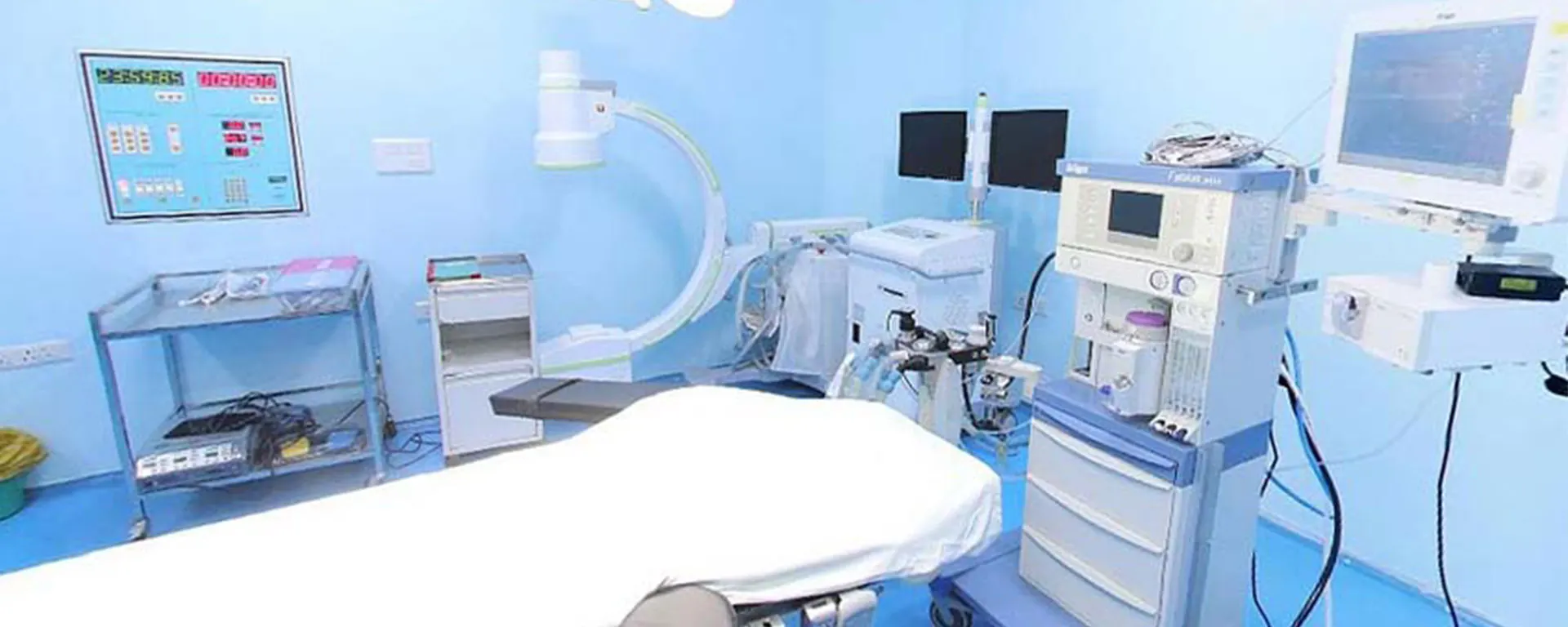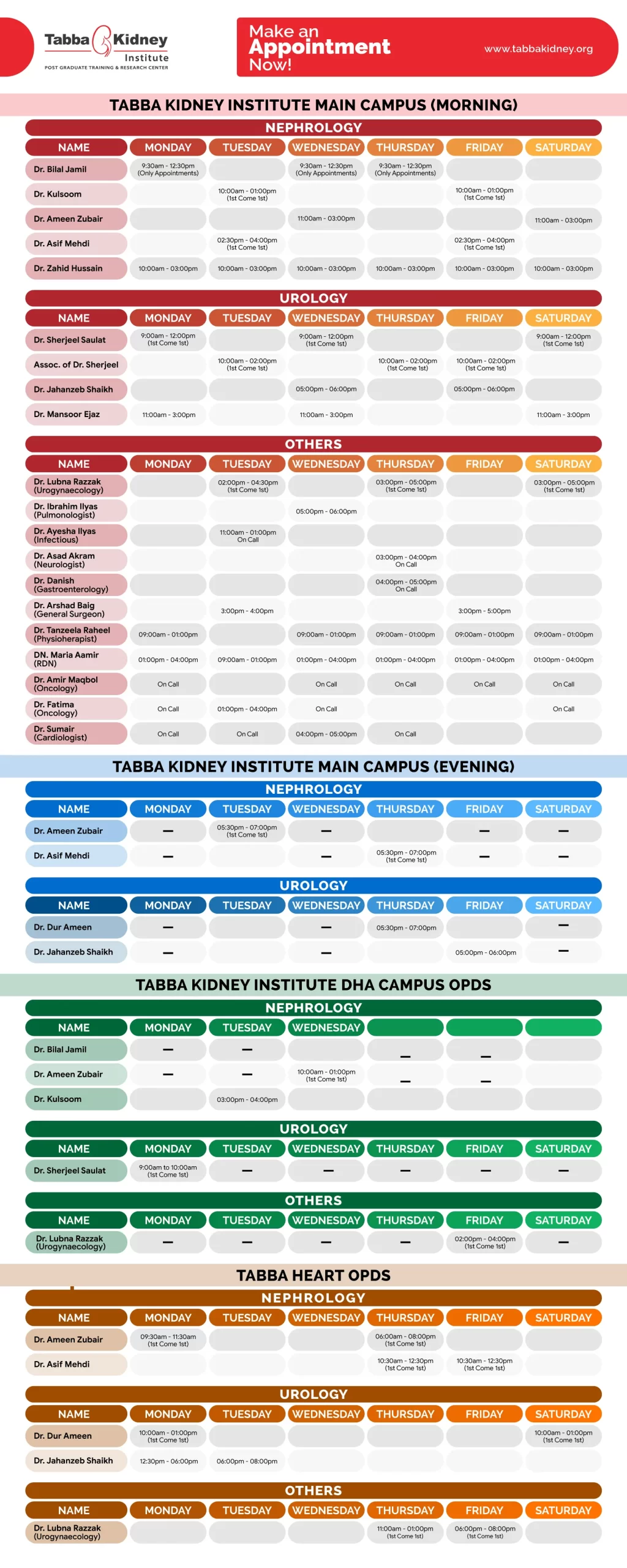OPD Services

Pulmonology
Tabba Kidney Institute outpatient services in Pulmonology begin with a thorough diagnostic process aimed at identifying and understanding various pulmonary conditions.
Through detailed patient history assessments, comprehensive physical examinations, and advanced diagnostic tests, our team of experienced pulmonologists works diligently to uncover the underlying causes of respiratory symptoms such as coughing, shortness of breath, and chest discomfort.
These diagnostic measures may include pulmonary function tests, imaging studies (such as X-rays or CT scans) and laboratory analyses. By diagnostic techniques, we ensure accurate and timely diagnoses, laying the foundation for personalized treatment plans tailored to each patient’s unique needs.
Tabba Kidney Institute consultation services in Cardiology are essential for addressing cardiovascular health concerns. Diagnosis in this context involves a comprehensive assessment of cardiac function and potential cardiovascular conditions.
Our experienced cardiologists conduct thorough evaluations, which may include detailed medical histories, comprehensive physical examinations, and advanced diagnostic tests. These assessments help us identify and understand various heart-related issues, such as coronary artery disease, heart failure, arrhythmias, and valvular disorders.
Utilizing techniques such as electrocardiograms (ECGs), echocardiograms, stress tests, and cardiac imaging studies, we aim to achieve precise diagnoses of cardiac conditions. By incorporating advanced diagnostic methods, we establish a solid foundation for crafting personalized treatment plans that cater to the individual needs of each patient, thereby fostering optimal heart health.
Neurology
At Tabba Kidney Institute, we offer comprehensive outpatient services in Neurology diagnosis involves identifying and understanding neurological conditions affecting the brain, spinal cord, nerves, and muscles.
Our practice initiates this process with a comprehensive assessment, including detailed patient history interviews, thorough neurological examinations, and advanced diagnostic tests. These evaluations allow our skilled neurologists to identify the underlying causes of symptoms such as headaches, seizures, movement disorders, cognitive impairment, and sensory abnormalities.
Diagnostic tools may include MRI and CT scans, electroencephalography (EEG), nerve conduction studies, and laboratory analyses of blood and cerebrospinal fluid. Through the use of cutting-edge diagnostic techniques, we ensure precise diagnoses, facilitating the development of personalized treatment plans tailored to each patient’s unique needs, and supporting their neurological health and overall well-being.
Infectious Diseases
Tabba Kidney Institute’s outpatient services in Infectious Diseases encompass a meticulous diagnostic process aimed at identifying and understanding illnesses caused by various pathogens, including bacteria, viruses, fungi, and parasites.
Our experienced infectious disease specialists conduct thorough patient evaluations, incorporating detailed medical histories and specialized laboratory tests. These assessments enable us to pinpoint the specific infectious agent responsible for the illness, facilitating the development of tailored treatment plans. Diagnostic tests may include blood cultures, serological assays, molecular tests (such as PCR), imaging studies, and other microbiological analyses.
Through our commitment to advanced diagnostic techniques, we ensure precise identification of infectious diseases, allowing for the timely initiation of appropriate therapies and optimizing patient outcomes.
Oncology
Oncology at the Tabba Kidney Institute, diagnosis is the critical first step in our comprehensive approach to addressing cancer. This involves delving into patients’ medical histories, conducting thorough physical examinations, and employing cutting-edge diagnostic methodologies.
Through a combination of sophisticated imaging techniques like MRI, CT scans, and PET scans, alongside minimally invasive procedures such as biopsies and detailed laboratory analyses, our goal is to precisely determine the type and stage of cancer.
By leveraging state-of-the-art diagnostic tools, we ensure accurate identification of oncological conditions, thereby laying the foundation for tailored treatment plans meticulously crafted to meet the unique requirements of each patient. Our commitment is not just to diagnose, but to empower patients with knowledge and support as they navigate their cancer journey towards optimal outcomes.
Nutrition
Tabba Kidney Institute, our consultation services in Nutrition play a crucial role in promoting overall health and well-being. Diagnosis in this context involves a comprehensive assessment of individuals’ nutritional status and dietary habits.
Our expert nutritionists conduct thorough evaluations, which may include gathering detailed dietary histories, assessing anthropometric measurements (such as height, weight, and body composition), analyzing biochemical markers, and evaluating lifestyle factors. Through this process, we aim to identify any nutritional deficiencies, imbalances, or dietary-related health concerns.
By employing evidence-based practices and personalized approaches, we develop tailored nutrition plans to address individual needs and optimize health outcomes. Our goal is to empower individuals with the knowledge and tools to make informed dietary choices and achieve long-term wellness.
Physiotherapy
Tabba Kidney Institute, our services in Physiotherapy are integral to promoting physical rehabilitation and enhancing quality of life. Diagnosis in this context involves a comprehensive assessment of musculoskeletal and movement-related issues.
Our skilled physiotherapists conduct thorough evaluations, which may include analyzing posture, assessing joint mobility and muscle strength, identifying areas of pain or dysfunction, and evaluating functional abilities.
Through this process, we aim to pinpoint the underlying causes of physical limitations or impairments. By employing evidence-based techniques and personalized treatment plans, we develop targeted rehabilitation programs to address individual needs and restore optimal function. Our goal is to empower individuals to regain mobility, manage pain, and improve overall physical well-being.
Cardiology
Clinic of Cardiology at the Tabba Kidney Institute, diagnosis is the cornerstone of our approach to addressing concerns related to cardiovascular health. Our skilled cardiologists conduct comprehensive assessments aimed at identifying and comprehending various heart-related conditions. This entails meticulous patient histories, thorough physical examinations, and utilization of advanced diagnostic tests.
Through procedures such as electrocardiograms (ECGs), echocardiograms, stress tests, and cardiac imaging, we strive for precise diagnosis of conditions such as coronary artery disease, heart failure, arrhythmias, and valvular disorders. By employing cutting-edge diagnostic methods, we ensure accurate identification of cardiac issues, enabling the development of tailored treatment plans to meet the unique needs of each patient and promote optimal cardiovascular well-being.
Gastroenterology
Gastroenterology Clinic at the Tabba Kidney Institute, diagnosis is a pivotal aspect of our commitment to addressing gastrointestinal health concerns.
Our experienced gastroenterologists conduct thorough assessments focused at identifying and understanding various digestive system disorders. This includes comprehensive patient evaluations utilization of advanced diagnostic tests.
Through procedures such as endoscopy, colonoscopy, imaging studies, and laboratory analyses, we aim to accurately diagnose conditions such as gastroesophageal reflux disease (GERD), inflammatory bowel disease (IBD), liver disorders, and pancreatic diseases. By employing cutting-edge diagnostic techniques, we ensure precise identification of gastrointestinal issues, laying the foundation for tailored treatment plans that meet the unique needs of each patient and promote optimal digestive health.

